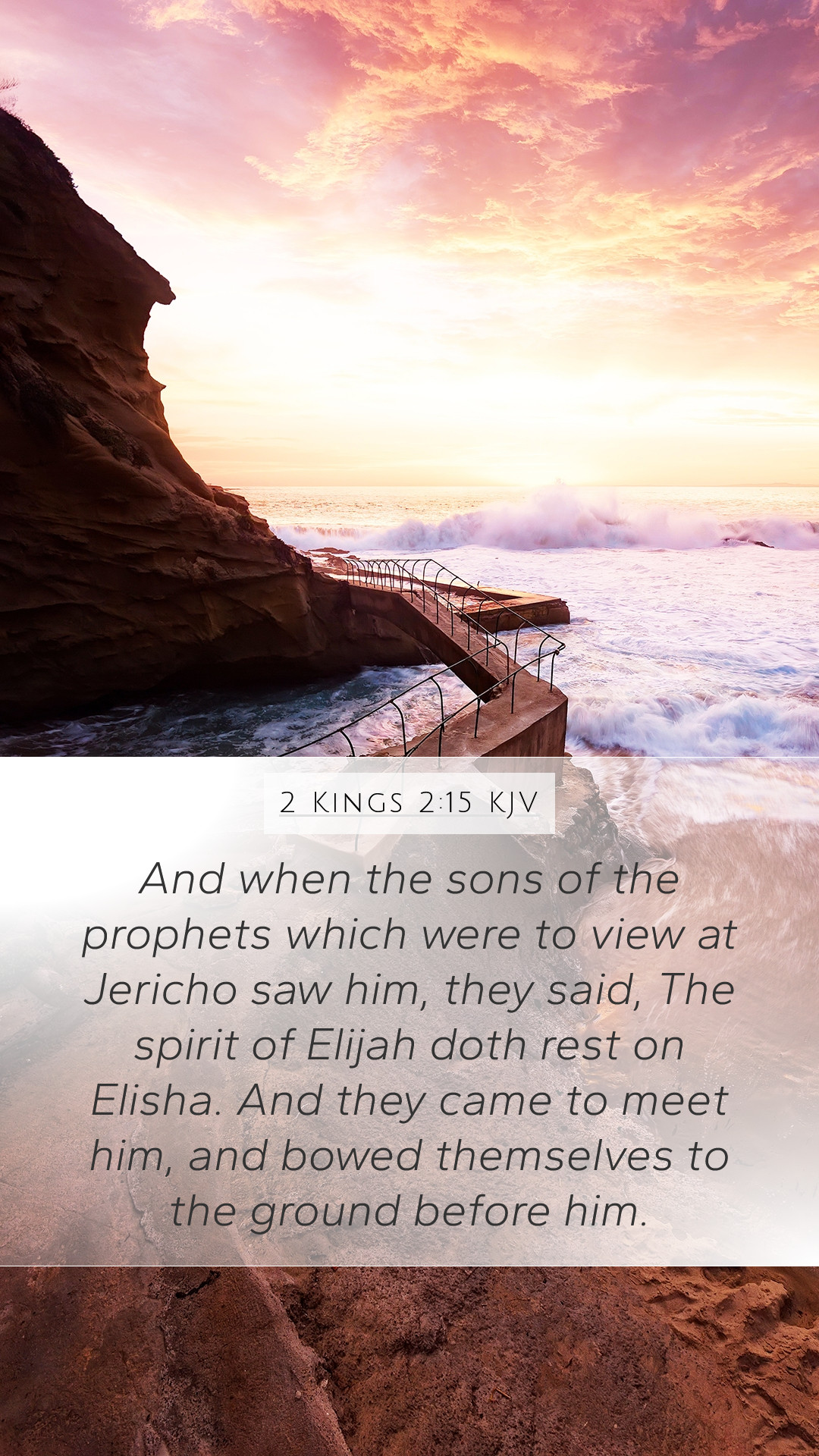Understanding 2 Kings 2:15
Bible Verse: 2 Kings 2:15 - "And when the sons of the prophets saw it, they said, The spirit of Elijah doth rest on Elisha. And they came to meet him, and bowed themselves to the ground before him."
Meaning of the Verse
This verse follows the dramatic departure of Elijah and the subsequent recognition of Elisha as his successor. Here, the "sons of the prophets" observe a transition of prophetic authority, understanding that the spirit of Elijah now rests upon Elisha. This recognition signifies not only Elisha's new role but also the continuation of God's work through his chosen leaders.
Commentary Insights
This analysis incorporates thoughts from various public domain commentaries:
Matthew Henry's Commentary:
Matthew Henry emphasizes the prophetic office’s nature and the significance of Elisha receiving a double portion of Elijah's spirit. He notes that the acknowledgment by the sons of the prophets shows that spiritual authority and anointing are recognized by God's people. Henry points out that this public affirmation lays the groundwork for Elisha’s ministry, demonstrating God’s continuity of guidance and power in leadership.
Albert Barnes' Notes:
Barnes elaborates on the prophetic community's response, indicating their recognition as a profound response to divine leadership. He highlights their immediate reverence towards Elisha, suggesting that their bowing indicates not merely respect but an acceptance of his new role. Furthermore, Barnes reflects on how this scene illustrates the importance of prophetic succession in Israel, underscoring that the Spirit’s work is enduring and may be passed on to the next generation.
Adam Clarke's Commentary:
Clarke discusses the significance of the spirit of Elijah resting upon Elisha as an emblem of divine empowerment and action. He elaborates on the communal recognition of this event, pointing out that it serves as a reminder to believers of the importance of spiritual continuity and integrity within the prophetic tradition. Clarke underlines the necessity of guidance from seasoned leaders while establishing new ones, providing a model for church structure and doctrinal fidelity.
Implications for Biblical Study
This verse serves as a prime example of how God orchestrates leadership transitions, illustrating vital theological principles for understanding Scripture. Here are some implications for further study:
- Scriptural Authority: This passage highlights the importance of recognizing God’s hand in leadership and prophetic calling.
- Spiritual Succession: The acknowledgment of Elisha by the sons of the prophets indicates the significance of mentorship and spiritual inheritance.
- Community Recognition: The collective response of the prophets illustrates that leadership is a shared experience rooted in community acknowledgement.
Practical Application
Understanding 2 Kings 2:15 can greatly influence how believers approach leadership and guidance in their communities. Here are a few applications:
- Recognizing and accepting new leaders can help maintain unity and purpose in faith communities.
- Encouraging mentorship allows for spiritual growth and continuity in teachings.
- Understanding the importance of the Holy Spirit’s work in leadership encourages reliance on divine guidance rather than purely human effort.
Related Bible Cross References
- 1 Kings 19:16: The anointing of Elisha as a prophet.
- 2 Kings 2:9: Elijah's request for a double portion of Elisha's spirit.
- 2 Kings 2:4: The prophetic community's recognition of Elijah's departure.
- Numbers 11:17: God's Spirit is given to leaders in guiding the people.
- Acts 8:18-19: The recognition of the Holy Spirit’s empowerment in leadership.
Conclusion
2 Kings 2:15 is not merely a historical account but a profound theological insight into God’s plan for leadership and prophetic ministry. By studying this verse, believers are equipped with biblical exegesis tools for deeper understanding and application in faith communities. Through collective recognition and the continuity of the Spirit's guidance, we see an enduring model for spiritual authority and communal involvement.


